GSK said that Zejula is the first monotherapy for patients with platinum-responsive advanced ovarian cancer in the European Union

GlaxoSmithKline head office, London. (Credit: Ian Wilson/Wikipedia.)
GlaxoSmithKline (GSK) has secured the European Commission (EC) approval for Zejula (niraparib) to treat a type of advanced ovarian cancer.
The European regulator approved Zejula as first-line monotherapy maintenance treatment for advanced epithelial high-grade ovarian, fallopian tube or primary peritoneal cancer in adults, in complete or partial response following platinum-based chemotherapy.
Zejula is an oral, once-daily poly (ADP-ribose) polymerase (PARP) inhibitor, currently being studied under various clinical trials. The company has undertaken a clinical development programme for the drug, evaluating potential combinations with other therapeutics.
With the EC approval, the drug becomes the only PARP inhibitor approved as a monotherapy for advanced ovarian cancer, regardless of their biomarker status in the European Union.
GSK R&D chief scientific officer and president Hal Barron said: “Over 65,000 women in Europe are diagnosed with ovarian cancer each year.
“This approval of Zejula means that many more women will have the option to receive this innovative medicine earlier, potentially extending the time they may spend without their devastating cancer progressing.”
Phase 3 PRIMA study supported regulatory approval for Zejula
The EC approval follows the US Food and Drug Administration (FDA) approval for a supplemental New Drug Application (sNDA) for Zejula, for the same indication, granted in April this year.
The FDA approval was based on data from the phase 3 PRIMA study, in which Zejula showed a clinically meaningful progression-free survival in the first-line maintenance setting.
The Phase 3 trial enrolled patients with newly diagnosed advanced ovarian cancer who responded to first-line treatment with platinum-based chemotherapy.
In the PRIMA study, Zejula has significantly improved the primary endpoint of Progression Free Survival (PFS), analysed initially in the homologous recombination deficient (HRd) population, followed by the overall population, regardless of biomarker status.
Treatment using Zejula showed 57% reduction in the risk of disease progression or death in the HRd population, while it lowered the risk of disease progression or death by 38% in the overall population, compared to placebo.
Zejula showed a safety profile that was consistent with the previously observed clinical safety profile.
PRIMA primary investigator Antonio Gonzalez-Martin said: “Until now, only women with BRCA-mutant (BRCAm) ovarian cancer, representing just 20% of patients with advanced ovarian cancer, were eligible to be treated with a PARP inhibitor as monotherapy in the first-line maintenance setting.
“Expanding the potential use of Zejula, regardless of biomarker status, is an important step forward in treating this challenging cancer.”
